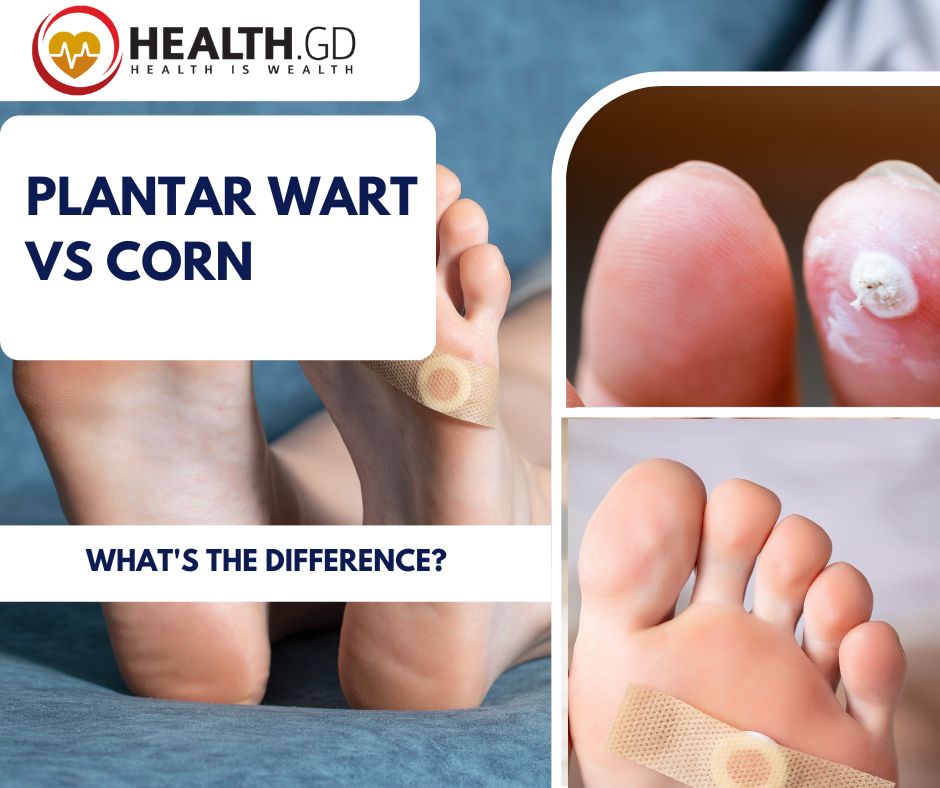Plantar Wart vs Corn
What’s the difference if you consider Plantar Wart vs Corn?

Plantar warts and corns are presumably familiar to you. Even though both may exist on foot, given that they resemble one other in appearance, corn and warts could be the same thing. The two, however, are opposed. Warts are often gritty and fleshy and feature black pinpoints. Corns resemble a high, hard lump surrounded by dry, flaky skin.
What is a wart?
A wart is a sore caused by a virus. Warts are small skin growths that can form anywhere on the body, including the legs. They can appear anywhere on the body. The most affected areas are the hands and fingers.
Our bodies are usually able to fight these viruses. However, warts can be caused by stress, a weakened immune system, or direct contact with the virus through the swimming pool floor. If not addressed, they will spread and proliferate.
What is corn?
A corn is a thick layer of skin that forms due to constant friction and pressure on the foot. As a result, they are commonly found on the toes and feet. The shape of corn is usually compared to that of an ice cream cone, with the pointy end pushing into your foot. The tapered section of the corn is deep and may be unpleasant in the future.
Corns, unlike plantar warts, are caused by wearing shoes that are either too tight or too loose. Putting too much pressure on your foot can cause corn. They can also appear only on foot, but plantar warts can appear anywhere on the body. Corn is classified into three types: hard, soft, and sweet.
Plantar Wart vs Corn: How to Identify
Squeeze Test
Squeeze the sides of the lesion to perform a pinch test. If it aches worse when you squeeze it, it’s probably a wart. However, if it hurts when you put direct pressure on it, it is most certainly corn.
Plantar Wart vs Corn: Causes
What Causes Plantar Warts?
Like other warts, plantar warts are brought on by a virus that enters the skin through slight scrapes or scratches. After the initial exposure, warts do not show up for several weeks or months.
Plantar wart spread may occur among people. Who share gym or athletic facilities or participate in team sports where bare feet are required, including yoga and martial arts. Plantar warts are more common in children than adults since most people develop immunity to the virus with age.
What Causes Corn?
Foot corns are thickened skin layers that form due to your skin’s reaction to pressure and friction. Long durations of standing or walking can lead to painful corns on the bottoms of your feet due to the weight of your body and the continual rubbing.
Difference Between Plantar Wart vs Corn:
1. Origin of Development
The main difference between plantar wart and corn is that plantar wart is a wart that grows on the bottom of the foot while corn is a small growth on the skin that is caused by the buildup of dead skin cells.
Corn develops in the hardened layers of skin, whereas warts contain little tiny spots within the lesion (blood vessels).
2. Causes:
Corn are growths caused by pressure, and plantar warts are caused by a virus.
3. Pain Sensitivity:
When you apply direct pressure to corn, it hurts more. Warts, on the other hand, hurt more when you pinch the sides like a pimple.
4. Appearance:
Warts also bleed more efficiently and have a cauliflower-like look. You may also see a disruption in the typical skin lines and maybe even flecks of dried blood.
Here are some factors that a podiatrist considers while determining the difference between a corn and a wart.
Plantar Wart vs Corn: Prevention
Prevention of warts
Warts are typically caused by human papillomavirus (HPV) and are therefore very contagious. The best way to prevent warts is to avoid coming in contact with the virus. This means not sharing towels, clothing, or other personal items with someone who has warts.
It also means avoiding contact with surfaces that may be contaminated with the virus, such as public showers or locker room floors. In addition, you can help prevent warts by keeping your skin clean and dry and by not picking at or biting your nails.
Prevention of Corns
You can prevent corns by wearing comfortable, well-fitting shoes; avoiding shoes that are tight or rub against the skin; and keeping the feet clean and dry. Additionally, it is important to take care of any existing corns or calluses, as these can become painful and lead to further corn development.
Plantar Wart vs Corn: Treatment
Treatment of Warts
Depending on their severity, warts can be treated in a variety of ways. Your doctor may advise you to use prescription drugs, freeze the wart, or have a brief treatment to remove the wart.
In some cases, warts can go away on their own. Some warts can be removed by freezing them (cryotherapy). Warts can also be removed by surgery. In rare cases, warts can lead to more serious problems. If you have warts, you should see your doctor.
Treatment of Corns
Because shoes cause corn, the first step in treating them is to quit wearing the shoes that cause them. To avoid more friction, wear only shoes that fit your feet properly and are suited for your chosen everyday activities. You can also use specific shoe inserts to alleviate the pain caused by corns. Soaking your feet in warm water can also help to relieve and cure corn. The water softens the corn, allowing you to file them down gently with a pumice stone. If your corns do not respond to at-home therapy, you should see an expert at any foot and ankle center.








